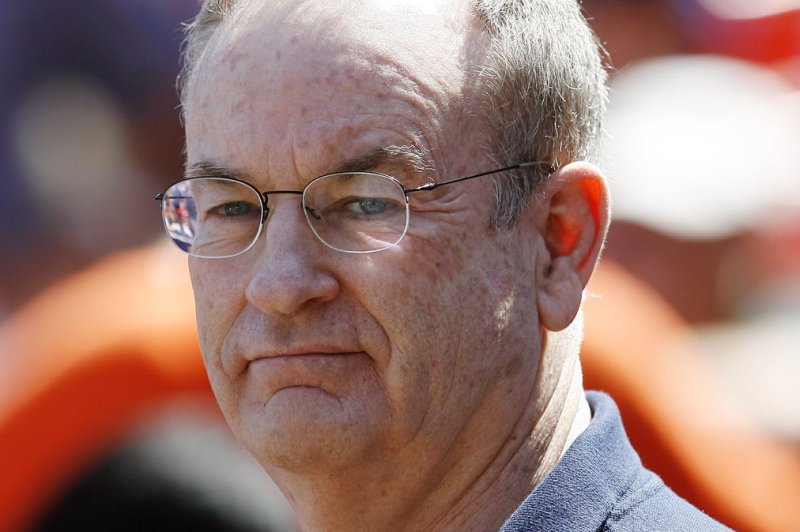Bill O'Reilly at Shea Stadium in New York City on April 22, 2007. File photo by John Angelillo/UPI |
License Photo
Fox News pundit Bill O'Reilly is under fire for claiming to have been, well, "under fire," or rather, as he put it, "in a war zone," during the Falklands war, when in reality no independent reporters made it to the islands.
Neither Scoop's fictional novel war correspondent William Boot, nor William (Bill) O'Reilly of Fox News, will be first nor the last correspondents to falsely claim to have seen "combat action" when in fact they were many miles away.
In more than a dozen conflicts this correspondent has covered there have always been a few reporters who were reluctant to go up to the front lines, saying they needed to get an overall picture of the situation. In reality they were too afraid of the risks involved in going all the way to the front lines. And often just as afraid of telling their editors that they were just not cut out for this line of work.
There is nothing to be ashamed of in having fears while facing the perils of war. In fact most sane people don't want to go to war. One has to be a little bit deranged to volunteer to go into a war zone. Most of us who have been in a combat zone tell ourselves and others the reason we do this is because we want to show the world the insanity of war or some other noble excuse. And at times we may even believe it ourselves.
The plain truth is that war is addicting. There is this great adrenaline rush, this feeling of having tempted or cheated death. There is a strong sense of camaraderie that develops with fellow correspondents. There is the glory of being able to say "I have been to hell," and of writing compelling stories and of making some amazing images that cannot be found elsewhere. There is a sense of empowerment is being able to write about such life and death issues that makes everything else seem tame by comparison.
The power of the media is not to be underestimated when it comes to covering conflicts. It was media after all -- television in particular -- that contributed in a large part in putting an end to the U.S. involvement in the Vietnam War.
Images on the Six o'clock news showing U.S. casualties in Vietnam day after day more than anything else put an end to the conflict in Southeast Asia, at least as far as U.S. involvement was concerned.
Vietnam was the last conflict involving the U.S. military where the media had unlimited access. Any journalist arriving in Saigon would check in with the military media bureau, would be issued press credentials and with those, would hop onto any U.S. military transport, from a Jeep to a helicopter and move around the country and the war zone at will, filming, photographing and interviewing whomever they wanted.
This total freedom of the press proved very costly for the U.S. military, some say it cost them the war. But it was the last time the media would be given such free range in a war zone.
For the press covering the U.S. military in combat it went from one extreme to the other; from Vietnam to Desert Storm, where the military tried to limit and funnel all media access through the JPAB (Joint Public Affairs Bureau).
The war in the Falklands was one where the media was completely controlled by the military. Both British and Argentines kept a very tight lid on what was going on around the islands. The remoteness of the combat area helped the military control what information went out and the only way in which the media could access the zone was aboard vessels of the Royal Navy.
Having learned their lesson in Vietnam, the U.S. military under President George Bush (the elder) deployed U.S. troops to liberate Kuwait after it was occupied by Iraq, then under Saddam Hussein. The U.S. military introduced a pool system and demanded that any journalist who wanted to be accredited would have to sign an agreement abiding by a number of rules.
Covering the Falklands war from the Argentine capital Buenos Aires, a distance of some 1,190 miles, William O'Reilly's combat experience may well resemble that of William Boot in covering his war in "Ishmaelia," the fictitious country in Scoop. Neither was a war zone.
Claude Salhani is a senior editor with Trend News Agency, and former war correspondent and a contributing editor to UPI.















